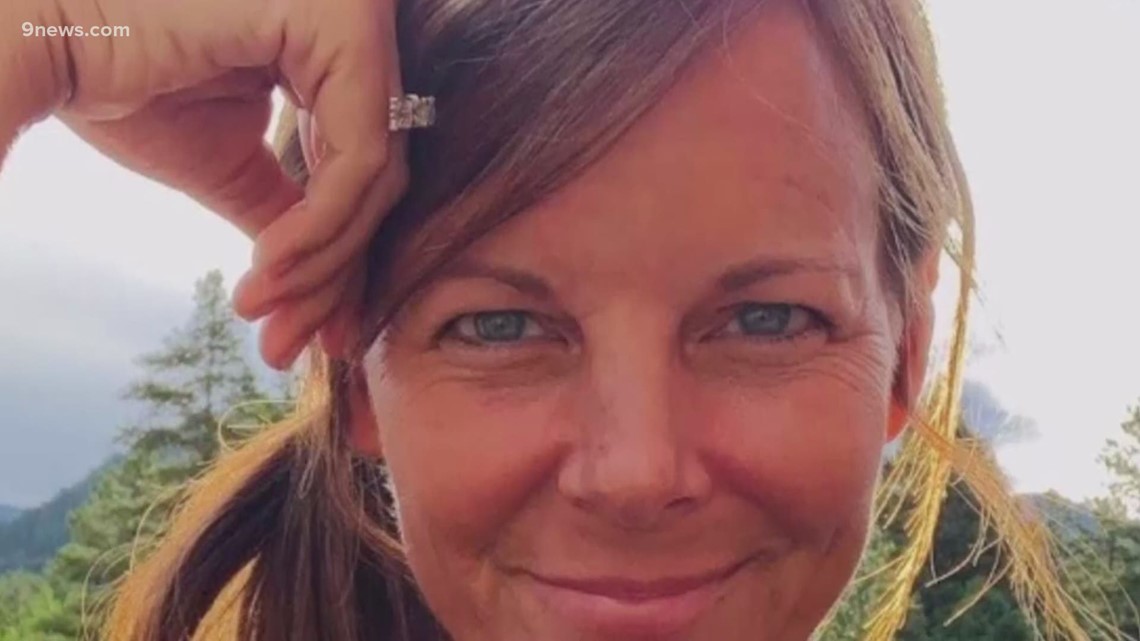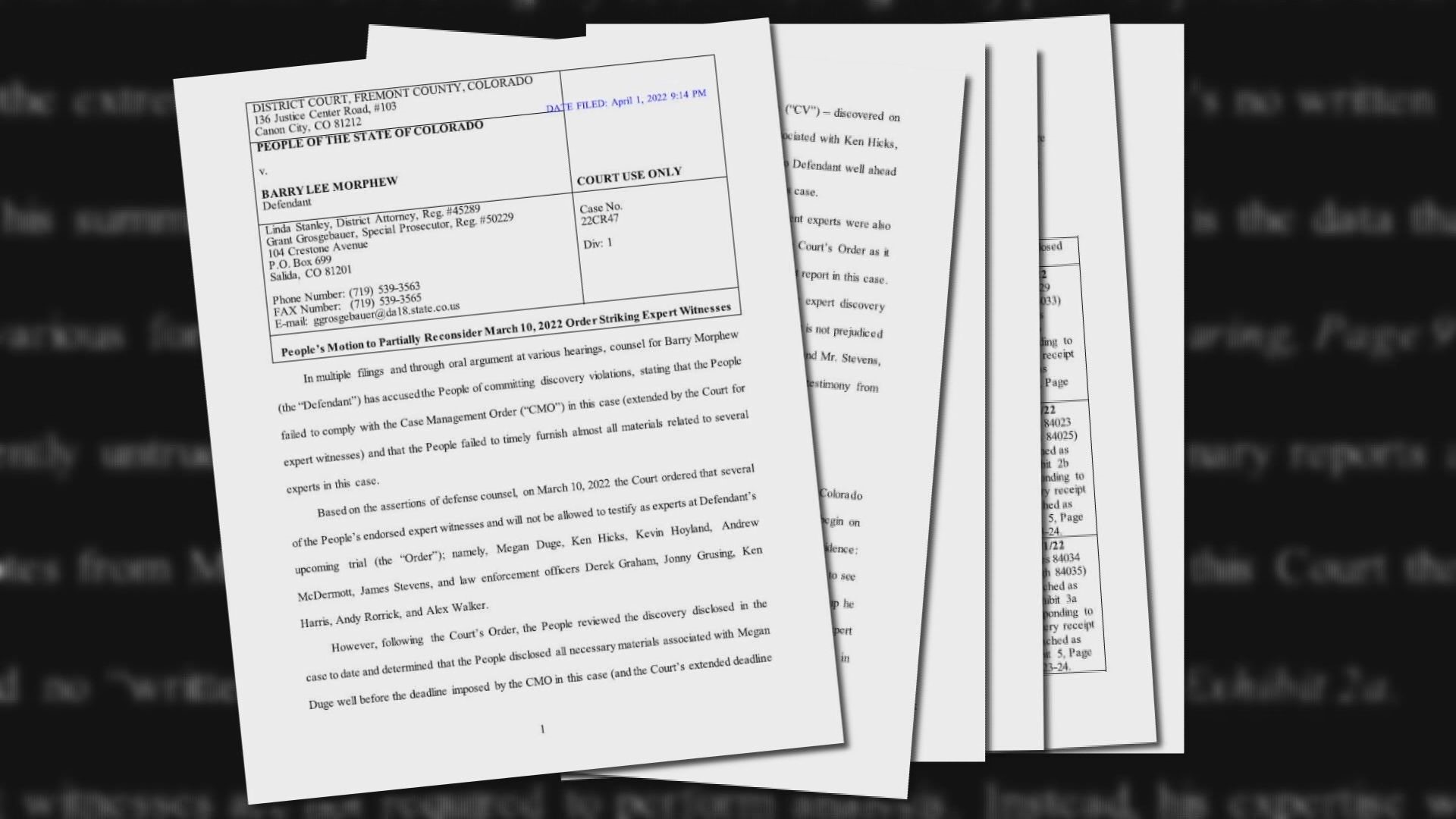FREMONT COUNTY, Colo. — Documents obtained by 9NEWS from the Fremont County court clerk through a records request reveal the prosecution team in the Barry Morphew case has asked the judge to reinstate key expert witnesses in the case, saying "these experts and their testimony are critical to the People's case."
The prosecution's motion for "reconsideration of the court's March 10, 2022 order to strike various prosecution experts due to their pattern of violations of court orders and Rule 16," is included in the court documents.
Fremont County judge Ramsey Lama on Friday declined to dismiss the case against Morphew, who is charged with first-degree murder in connection with the May 2020 disappearance and presumed death of his wife Suzanne.
However, Lama issued sanctions against the prosecution by excluding 12 of their 14 endorsed expert witnesses, stating in the order that it was a "significant," but "warranted" sanction given their record of compliance with the court.
That record indicated a "continuing pattern" by the prosecution to fail to comply with obligations under Rule 16, which is their obligation to turn over discovery ahead of trial. The judge wrote their "actions amount to negligent, and arguably, reckless disregard" of the rule and subsequent orders.
"The prosecution's case will be very much damaged at trial. It will be substantially impaired if they are not able to call these witnesses," 9NEWS legal expert Scott Robinson said. "But remember, that was the judge’s order. They had violated discovery rules, and as a consequence they would be barred from calling these witnesses."
Morphew's defense team accused the prosecution team of "committing discovery violations, stating that the People failed to comply with the Case Management Order (CMO)." The defense attorneys argue the prosecution didn't turn over all expert-related materials in the case.
Lama ordered that experts Megan Duge, Ken Hicks, Kevin Hoyland, Andrew McDermott, James Stevens and officers Derek Graham, Jonny Grusing, Ken Harris, Andy Rorrick and Alex Walker not be allowed to testify at the trial in their capacity as experts.
"If the ruling to exclude the witnesses stands, it’s not the same thing as a dismissal, but it certainly cripples the prosecution’s case substantially," Robinson said. "To such an extent that they are now obviously panicking about their chance at trial."
The prosecution's motion says the exclusion of these witnesses damages their case "in a profound way." It continues, "By excluding the most damaging impeachment information against the defendant (cell phone data, truck telematics and GPS/CDR locations) the court has imposed sanctions tantamount to dismissal, with the defendant suffering a complete windfall."
"It is relatively rare for a judge to exclude witnesses," Robinson said. "I think it really speaks to the judge’s perception of the seriousness of the misconduct of the prosecution."
Now the future of the trial set to start on April 28 is in question, considering prosecutors have told the judge their case is greatly hindered without the testimony of the expert witnesses.
Once a jury is seated, the double jeopardy rule goes into effect. That means that if the trial moved forward and Morphew was acquitted, he wouldn’t be able to be charged and tried again for the same crime. If the charges are dropped before a jury is seated, prosecutors could bring new charges if new evidence is found.
"Since a jury has not been selected, double jeopardy would not bar a future trial if the case were refiled," Robinson said. "There would have to be substantial new evidence to support a refiling of this case if it’s dismissed sometime in the future."
Motion to reconsider
The prosecution filed a motion on Monday that asks the judge to reconsider his order in regard to experts Duge, Hicks, Hoyland and Stevens.
The motion reads, "These experts and their testimony are critical to the People's case."
In the motion, prosecutors say their case "relies heavily on evidence of Morphew's motive to harm his wife, the opportunity he alone had as he was the last person to see Suzanne alive, the inconsistencies in his statements to law enforcement and the ultimate coverup he perpetrated the day after and in the following months."
The team cites in the motion the importance of expert testimony on data downloaded from the suspect's truck that "disputes the defendant's initial alibi that he 'went to bed early'" on the night before Suzanne was reported missing.
The motion states there is also information downloaded from several phones included in the case – but specifically, data extracted from the defendant's phone that shows data was "deleted in bulk before the phone was seized," that included 381 text messages, 25 calls and 58 saved locations.
Cell phone data tracking information used from Suzanne's phone and information extracted from the defendant's truck, Bobcat and phone help the prosecution determine a timeline of the events between May 8, 2020 and May 10, 2020, reads the motion.
Experts from the prosecution's list also include testimony on data from the defendant's F-350 truck, other data from physical items and information obtained by search warrant.
> Read the motion
Defense team response
The defense team filed a response to the prosecution's motion, asking the judge to deny that motion.
The defense team's response to the court states, "The facts in this case are insufficient to reach a murder conviction and the stricken experts do nothing more than bolster uncorroborated theories and hunches the prosecution would like the jury to adopt in what would be a specious and wrongful conviction."
The defense team's reply says that six weeks after the prosecution's deadline to provide expert disclosures to the defense and three weeks after the court struck these witnesses, the prosecution now wants to provide the information to the court with "new information and reports, that it claims are critical to prove its theory of murder."
The defense's counsel says the district attorney's office is experienced in numerous high profile, high stakes cases, and "To think this prosecution team cannot comply with court orders and behaves in this way is just negligent, is ludicrous and it certainly willful."
The defense cites factual errors, dishonesty, prejudice, misstatements, ethics violations, "outrageous governmental misconduct" and violations of court orders from the prosecution team. In its reply, the team asks the judge to deny the motion to reconsider, and once again asks the judge to dismiss the case.
> Read the response
Prosecution responds
In a reply to the defense's motion, the prosecution says they disclosed "all necessary materials associated," with witnesses. They again ask the court to reconsider experts Duge, Hicks, Hoyland and Stevens.
> Read the reply
Trial date set
Barry Morphew was arrested on murder charges on May 5, almost a year after Suzanne was last seen.


In September, then-Judge Patrick Murphy found there was probable cause to move the case forward to trial.
Morphew is charged with:
- First-degree murder
- Tampering with a deceased human body
- Tampering with physical evidence
- Possession of a dangerous weapon
- Attempt to influence a public servant
Morphew's trial is set to begin April 28.
> Do you have a news tip on this story or any other story? We want to hear from you! Tell us about it by emailing newstips@9news.com.
SUGGESTED VIDEOS: The disappearance of Suzanne Morphew

